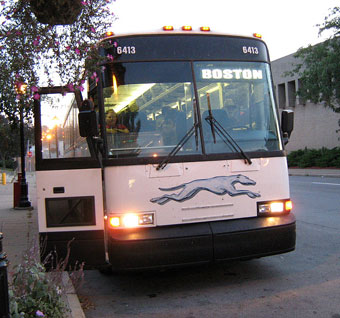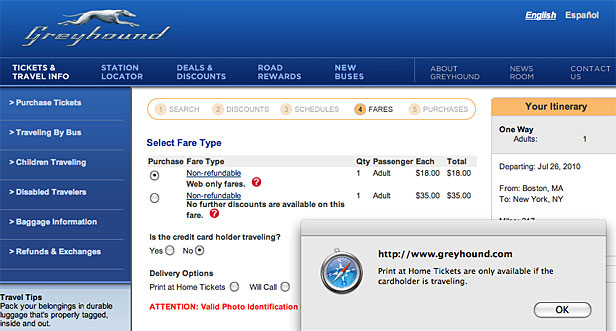Greyhound can’t explain large fee added to bus ticket

Greyhound charges at $18 “gift ticket fee” when a credit card holder buys a ticket for another person and doesn’t travel as well. Company representatives couldn’t explain the fee. (Photo: William Wilson)
What does a $22 one-way Greyhound bus ticket cost?
If you’re paying your own way and you guessed $22, you’re right. But if someone is paying for you, or if you’re paying for someone else, a $22 ticket costs $40.
That’s because of an $18 “gift ticket fee” added when the name on the credit card that pays for the ticket isn’t the name of the person traveling.
Obviously, if you’re paying more than $200 for someone riding from Los Angeles to Boston, the gift ticket fee might not faze you. It could just seem like another fee. In the words of Greyhound spokeswoman Bonnie Bastian, “It’s a fee like with any travel you do.”
But for travel closer to home, that fee is going to look outsized, and to fairly outrageous proportions. It’s 45 percent of the $40 cost of travel to or from Hartford, Conn., and it’s 50 percent of the cost for the popular Boston-New York run. The average Greyhound rider earns $35,000 a year, Bastian said, and company data show more than 637,000 passengers traveling through South Station last year.
Other bus services operating out of Boston’s South Station do not charge the fee, including Greyhound operating partner Peter Pan.
It’s not easy to pin Greyhound down on this “gift ticket fee.” Representatives can’t seem to explain what it is or what it does — in other words, what riders are paying for and what Greyhound does with the money to justify it.
Fraud prevention
Here’s the first explanation, from a ticket seller and customer service representative named Dalma who spoke via telephone Thursday: “In order to avoid fraud, the $18 fee is charged. That way we know someone else bought the ticket. It helps us avoid fraud because we will not be requesting the card number, because you could go to any Greyhound station in the country.”
Prodded as to how that helped prevent fraud, since the person showing up at will call to pick up a ticket has to give their name and a password set during the online purchase, Dalma came up blank:
“I can only give you the explanation [provided as] company policy. To be completely honest with you, I can only tell you what we have on this system. There is no way to avoid the fee. I do apologize for the inconvenience.”
Bastian had a chance to explain Friday.
Her answer was at first different from Dalma’s — “It’s a processing fee, because you’re changing the name on the ticket,” was her first try — but only moments later fell in line when she heard what Dalma had said: “That sounds right. It’s a fraud fee, to prevent anyone from using your credit card, from committing fraud with your credit card.”
But she couldn’t explain Friday morning how the fee was applied or what Greyhound did as a fraud prevention measure — or even how the ticket buyer is at risk in the first place.
Absolutely not fraud prevention
It was not surprising, then, that in the afternoon Bastian called back to say a customer service supervisor had stated definitively that the gift ticket fee had nothing to do with fraud and, in reference to Dalma’s answer, despite being told Dalma had testified to being able to give only a company-scripted answer, “I can’t say why she said that.”
But Bastian’s answer was no more complete. Despite the several hours she had to research the issue, she still could not describe why the fee was needed or how it was used, even saying at one point that “the cost of taking care of that transaction” involved “a couple of people … it has to be processed by people online.”
“It is kind of a ticket processing fee for the time and expense involved in transferring the name,” she said, but was unable to explain what that meant or any role played by people in a Web-based credit card transaction resulting in a computer printing out a ticket at a Greyhound station ticket counter. Workers there would have to enter a name into a computer rather than a credit card number, but the additional time spent seems insignificant.
“I just wanted to call back and say it’s not a fraud fee,” Bastian said.
Left unexplored, because it was after 5 p.m. Friday, was another odd aspect of the Greyhound system: It is impossible to print tickets at home, on a printer attached to a personal computer, unless the buyer of the tickets is traveling. There are many times a credit card holder may want to buy a Greyhound ticket for someone in their own household who will be traveling to another destination — but they will find it impossible to buy that single ticket, print it and hand it to the person traveling.
This is not to prevent fraud, Bastian said. Her e-mailed explanation, suddenly substituting “third-party tickets” for “gift tickets”:
“Greyhound introduced print at home tickets to its passengers nationwide about one year ago. As we continue to enhance our Web site and its functionality, we may provide the ability to print third party tickets at home however we do not have that capability yet at this time.”

Greyhound’s website doesn’t allow printing at home if the ticket buyer isn’t also traveling.

I’ll be forward and say, I wanted to post in hope that Greyhound gets a class action suit filed against them. A company sticking you with fees that they themselves can’t explain is in my opinion price gouging. This seems similar, in my eyes, as the credit card class action suit for these junk fees. Especially when you think that most people travelling on Greyhound are lower to mid income and would rarely have the power to challenge such… Or what about parents buying tickets for their kids, the elderly, etc… How many people are being taken advantage of by these JUNK fees?
Reference:
https://www.paymentcardsettlement.com/en
I’m posting here hoping that some attorney(s) will pick this up. Greyhound SHAME on you…